Rekindling Our Commitment with Inspiration from the Aurora Institute Symposium 2023
CompetencyWorks Blog
At the Aurora Institute Symposium 2023, we piloted Networking Groups for a few different topics and affinity groups to support making connections and building community. An inaugural crew of Networking and Storytelling Stewards, including the author, Nik Namba from Transcend, guided the groups. We invited each steward to write a blog post with their reflections to continue the reach of #Aurora23.
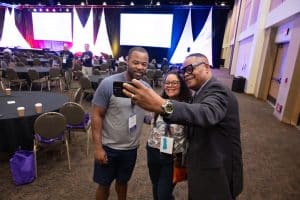 Picture this: the exhilarating warmth of reuniting with familiar faces after years apart, the joy of sharing meaningful moments, and the electric buzz of conversations that spark inspiration. This was the core of the Aurora Institute Symposium 2023, a long-awaited, back-in-person gathering that rekindled connections and ignited fresh ideas. Amidst the many enriching sessions and dynamic discussions, two standout concepts are front of mind:
Picture this: the exhilarating warmth of reuniting with familiar faces after years apart, the joy of sharing meaningful moments, and the electric buzz of conversations that spark inspiration. This was the core of the Aurora Institute Symposium 2023, a long-awaited, back-in-person gathering that rekindled connections and ignited fresh ideas. Amidst the many enriching sessions and dynamic discussions, two standout concepts are front of mind:
- Inspiring Community Visions: Diving into the heartwarming narratives of classrooms, schools, systems, and states that crafted community-based visions for their educational journeys were beacons of inspiration, showcasing the transformative power of shared purpose.
- Developing Amazing Humans: Exploring sessions that seamlessly intertwined student habits with academic practices, pushing the boundaries of conventional thinking, offered a glimpse into innovative approaches that foster holistic student development.
Get ready to embark on a journey through the most captivating moments of the Aurora Institute Symposium – an experience that not only rekindled connections but also sparked a genuine commitment to reimagining the future of education.
Inspiring Community Visions
In the vast array of this year’s discussions at the Aurora Institute Symposium, the spotlight shone brightly on the myriad tales of schools, systems, and states actively engaging in the art of listening, gathering, and analyzing diverse inputs. The overarching theme? The evolution towards competency-based education intertwined with a genuinely community-driven vision. The atmosphere was nothing short of electric, pulsating with excitement and emotions that transcended the conventional boundaries of educational dialogue.
What stood out to me were the palpable moments of connection and shared aspirations. Listening to districts like Lindsay Unified, Northern Cass, and Westminster Public Schools share stories around how families, empowered to voice their dreams for their children, wove narratives that echoed with hope. KnowledgeWorks and reDesign discussed how legislators have delved into the intricacies of local and state policies, fueled by a sincere desire for a more profound understanding and an eagerness to usher in necessary changes. Finally, hearing stories from educators across the country, sensing the potential to make the impact they had always envisioned, exuded a contagious enthusiasm that permeated every session.
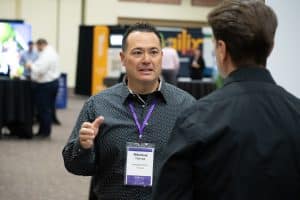
Alongside this collection of shared experiences, I found myself witnessing countless a-ha moments. Participants, in the throes of these revelations, discovered new solutions to existing constraints, unlocking possibilities that were once deemed impossible. The Symposium became a hub for transformation, where networking and connections thrived, extending far beyond the conference venue. Systems reached across boundaries, offering support during challenging moments, creating a robust network that lives well beyond the confines of a singular event.
Participants, armed with newfound insights, were inspired to return to their schools, systems, and states with a renewed sense of purpose. Presenters who seized the opportunity to share their stories left not only with profound inspiration drawn from engaged participants but also with a surge of newfound energy for their endeavors. In my opinion, this transformative experience, fueled by the act of sharing one’s narrative, translated into an across-the-board positive outcome. My sense is that every individual departed with an elevated sense of well-being compared to their initial arrival. From all angles, students emerged as the ultimate beneficiaries, positioned in the most advantageous winning seat as a direct result of this collective exchange.
Developing Amazing Humans
This year there was a noticeable uptick in sessions that wove together the crucial concepts of habits and academic practices. For years, the call for learners to cultivate independence, advocate for their own learning, and be propelled by goals and reflections has echoed through educational discourse. However, this year felt different – many workshops consciously integrated these principles into their frameworks. At the higher academic levels, this integration frequently dovetailed with real-world applications, such as work experiences, internships, and the concepts underpinning project-based learning.
As a former primary teacher and school leader, I’ve always sought elementary examples that illustrate this vital connection. This year, I had the privilege of participating in a session that delved explicitly into early learner agency – an indispensable ingredient for thriving and transforming the world. Unfortunately, agency is often not given the spotlight in young children’s educational experiences. In the session “Early Learners Deserve Agency Too: K-2 Agency Research, Tools, and the Lindsay Implementation Story,” we went beyond the surface, offering learning from a two-year exploration. Educators and leaders from Lindsay Unified School District, the Head of Schools from Red Bridge, many members of the Transcend team, and Silicon Schools Fund, as a funder to this work, co-facilitated the session. Content included a research primer on early learner agency and a set of practice cards designed to equip educators with actionable strategies. These cards not only outline ways to enhance agency but also showcase robust models actively implementing these practices. Importantly, all these resources are openly available here, designed not as a definitive solution but as catalysts for action-oriented conversations. The goal is to empower more young learners to develop habits while engaging with academic content.
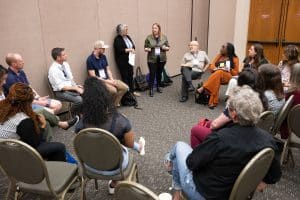 What adds a layer of beauty to this initiative is the collaborative spirit that drives it. The research primer synthesizes insights from over 32 individuals and organizations passionately invested in agency. Moreover, the schools and systems involved in the project represent a spectrum, encompassing both an independent school and a public school system, with the overarching collaborative effort spearheaded by a non-profit organization. This project epitomizes the boundless potential for students when we collectively move beyond artificial constraints and embrace the possibilities that emerge from collaborative, cross-sector partnerships.
What adds a layer of beauty to this initiative is the collaborative spirit that drives it. The research primer synthesizes insights from over 32 individuals and organizations passionately invested in agency. Moreover, the schools and systems involved in the project represent a spectrum, encompassing both an independent school and a public school system, with the overarching collaborative effort spearheaded by a non-profit organization. This project epitomizes the boundless potential for students when we collectively move beyond artificial constraints and embrace the possibilities that emerge from collaborative, cross-sector partnerships.
A Call to Action
The Symposium wasn’t merely a gathering – it was a catalyst for action. Seeds of change were sown, and the idea of planning community meetings and initiating dialogues for transformational shifts gained momentum. The educational landscape now flows with the energy of collective determination to forge a future where competency-based learning is not just a concept but a lived reality. Let’s rally together to ensure that these meaningful conversations don’t dwindle into silence.
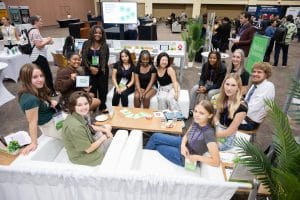 Taking a strategic approach through research and development is key for sustainable success before diving headfirst into implementation. Sometimes, we notice efforts to quickly change things up – like major shifts in instructional blocks, significant tweaks to bell schedules during the school year, or mid-cycle adjustments to progress monitoring and assessment methods. While these changes are well-intentioned and ambitious, it’s crucial to have thorough discussions with the community and other stakeholders before implementation.
Taking a strategic approach through research and development is key for sustainable success before diving headfirst into implementation. Sometimes, we notice efforts to quickly change things up – like major shifts in instructional blocks, significant tweaks to bell schedules during the school year, or mid-cycle adjustments to progress monitoring and assessment methods. While these changes are well-intentioned and ambitious, it’s crucial to have thorough discussions with the community and other stakeholders before implementation.
A great initial move is to proactively identify initiatives, make unwavering student-centered commitments, and dive into action. Through this iterative cyclical process of learning, envisioning, building, and trying, we collectively pave the way for the most extraordinary and equitable student experiences for each of our communities. I take pride in standing shoulder to shoulder with everyone dedicated to this remarkable work for students. Now, let’s turn our commitment into action and champion transformative change for the betterment of our students and communities.
Learn More
- Together We Shine Brighter: A Teacher’s Insights from #Aurora23
- Flashback Friday Inspired by #Aurora23
- Student Vlogs: A New Way to Elevate Student Voice in CBE
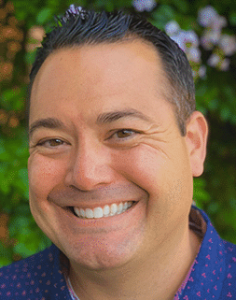 Nikolaus Namba is currently a Managing Partner at Transcend, a role he’s been in for the past five years. Before that, he wore different hats at Transcend, serving as a Partner and Senior Director of Systems Leadership. His entire career has been in education, where he’s held many positions – teaching, academic coaching, Principal, Director of 21st Century Learning, and Chief Academic Officer. He’s worked in various school districts and charter organizations, including Lindsay Unified School District, Ingenium Schools, and Westminster Public Schools. Nik’s all about personalizing learning using a competency-based systems approach. His track record represents success and commitment, always with a focus on putting learners first. To him, true learner-centered leaders embody qualities like vulnerability, authentic care, and integrity.
Nikolaus Namba is currently a Managing Partner at Transcend, a role he’s been in for the past five years. Before that, he wore different hats at Transcend, serving as a Partner and Senior Director of Systems Leadership. His entire career has been in education, where he’s held many positions – teaching, academic coaching, Principal, Director of 21st Century Learning, and Chief Academic Officer. He’s worked in various school districts and charter organizations, including Lindsay Unified School District, Ingenium Schools, and Westminster Public Schools. Nik’s all about personalizing learning using a competency-based systems approach. His track record represents success and commitment, always with a focus on putting learners first. To him, true learner-centered leaders embody qualities like vulnerability, authentic care, and integrity.
He holds a Masters Degree in Educational Psychology from the University of Colorado at Denver, and a Bachelor of Arts Degree in Liberal Studies from California Lutheran University. It was here that his passion for supporting young learners developed as he worked in the Early Childhood Center, and his understanding of community support was initiated. Nik currently lives in Moorpark with his wife Amanda, son Ty (9), and daughter Ellie (7).